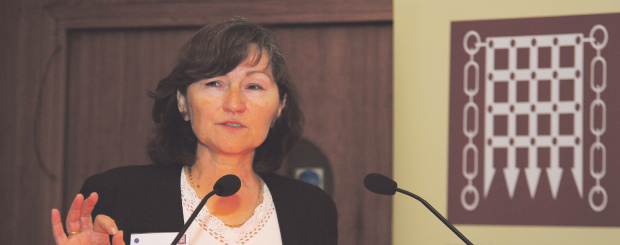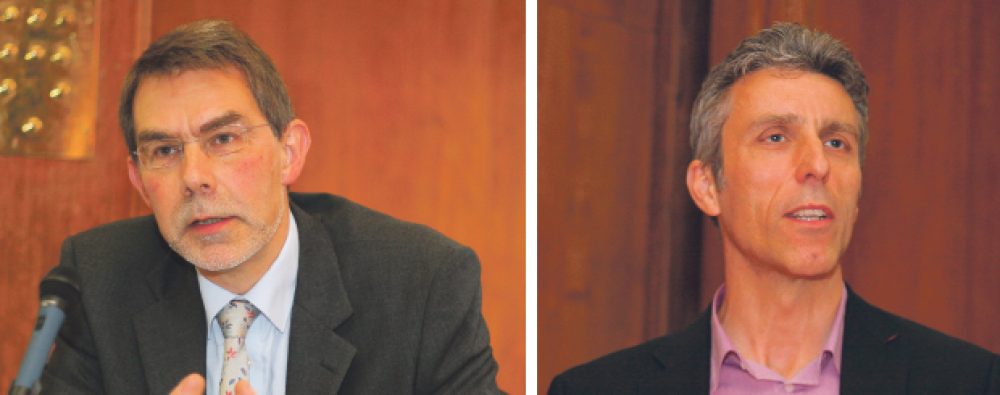Tom Wilson, director, UnionLearn, TUC David Hughes, chief executive, NIACE
Ever-rising levels of unemployment, lack of skills among sections of the population, equality, changing policy and funding rates are just some of the issues that those in further education need to battle on a daily basis.
But how do they move forward? The potential answers were discussed at The Future of Adult Learning, organised by the Westminster Employment Forum, last Tuesday.
Deborah Roseveare, head of the skills beyond school division in the directorate for education at the Organisation for Economic Co-operation and Development (OECD), said there are three reasons why adult learning matters.
She said: “First, it contributes to human capital development, both economic and social. Secondly, the changing skills demand, especially over the 40 years of working life.
“Thirdly, demographics mean if you want to boost the human capital and you want to meet changing skills demands, then you have to look at adult learning, because the university cohort adds such a little fraction to the labour force each year.”
Mrs Roseveare also told delegates the OECD is currently carrying out a survey to assess skills held by adults, which will be available in October.
She said: “One of the challenges that we have is that we don’t know what skills adults actually have and the good news is we are currently carrying out a major international survey of adult foundation skills.
“This is looking at literacy, numeracy and problem solving and a lot of information about background and how they are using their skills if they are in the workplace.”
Mrs Roseveare said adult learning should not be looked at “in isolation”, adding: “Adult learning needs to be linked to other economic and social policies.
“We are, in a few weeks, going to be releasing the OECD skills strategy, which looks at the evidence and sets out a framework for developing better policies for skills development and utilisation.”
David Hughes, the chief executive of the National Institute for Adult Continuing Education (NIACE), spoke of the opportunities and challenges for adult learning.
“I’m not wholly optimistic about the way things are going at the moment.
“Therefore, opportunities are difficult to focus on and actually I think challenges are what we should be focusing on,” he said.
He began with six “areas of context”, such as the economic crisis, which Mr Hughes believes is also a social crisis.
The second point, he added, is government uncertainty, “about understanding what they are about and what they stand for”.
His third point revolved around “fewer adults” learning, while the threat to widening participation, caused by declining numbers, funding cuts and reductions in the unit of funding for learning, was his fourth point.
He added: “The fifth is a shift, particularly around level 3, from state funding to state financing, so we are moving into a world where we are asking people to take loans at level 3 which has never happened before.
“We should be worrying about the impact of that.”
His final point related to the government’s localism agenda.
Moving on, Mr Hughes then spoke of key challenges, including the “need to promote adult learning in terms of its wider benefits” and inequality.
He also added: “I think there is going to be a social wave of concern around social inequalities in our society. We’ve got to get in there and show just how unequal so much of the adult learning sector is in terms of the sorts of people who participate.”
Mr Hughes also stressed “all forms of adult learning are equally important” and the best employers “really do understand that learning is an important skill”.
However, he also suggested that the sector needs to “rehabilitate the word ‘learning’”.
He said: “We’ve focused too much on skills, too much on training and too much on teaching, rather than learning.
I’m not wholly optimistic about the way things are going at the moment”
“It’s positive to us in this room but if you go to many people out there, they don’t think learning is a positive. If you think about people taking their driving tests, they are proud if they do it in as fewer lessons as possible, as the learning is not what they want, it’s the passing.
Meanwhile, Tom Wilson, director of unionlearn, the learning and skills organisation of the TUC, said: “From a trade union perspective, we are quite optimistic.”
He also said: “Through unionlearn, we have around 230,000 people every year going through some form of learning.”
Mr Wilson spoke of a recent trip to Germany with skills minister John Hayes.
“There isn’t that same distinction between personal, informal and what counts as company learning. There is encouragement for all sorts of learning and a recognition that the two blend into each other,” said Mr Wilson.
The director also said it is the union’s view that, in order to get “any kind of job” in Britain today, you need “at least” a level 2.
He said: “Most of the young unemployed are people who can’t get a job, because they can’t get a level 2. If you think about all sorts of jobs, retail, working construction sites, social care, restaurants, hotels, they require basic levels of skills, which they didn’t used to.”
Mr Wilson later said: “It’s not the squeezed middle, it’s the excluded bottom.
“The two or three million out there, of any age, who can’t get in the workplace or easily engaged and we have to reach out to them and the way to do that is informal learning.”

Deborah Roseveare, head of Skills Beyond School Division, Directorate for Education, OECD
Other discussions continued with talks from representatives of the UK Commission for Employment and Skills, Working Links, Chartered Institute of Personnel and Development, National Numeracy, UNISON and Rolls Royce.
Meanwhile, president-elect for Association of Colleges, Maggie Galliers, gave an insight as principal of Leicester College into adult apprenticeships.
But it was a question from the floor, surrounding the “disappearance” of ESOL, which caught the eye.
Mr Hughes said: “It’s a question we keep asking ministers.
“It’s gone quiet, I think really simply for political reasons and that mixture between ESOL being about people coming in to this country and that whole paranoia, right-wing paranoia, about immigration.
“They just want to put it to bed. What they’ve done is said nothing about it and hope it goes away as an issue.
“We should be promoting ESOL as a positive part of creating a society that we want to live in. That’s the kind of positive that we want to turn it around to and I think the government and ministers don’t want to talk about it.
“So keep asking and keep prodding them.”









Your thoughts